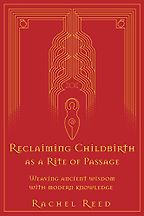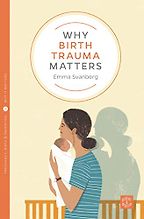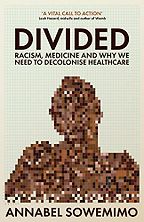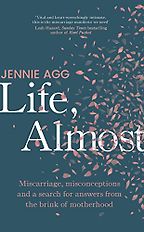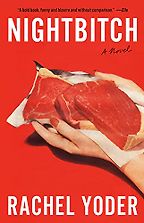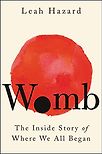The books you’ve chosen interpret childbirth in the broadest sense. There’s great range in this list; did you have a guiding principle in mind when selecting your recommended books?
I did think as I was compiling this list that there are different ways I could have gone about it, and it might have been easier in a way to come up with a list that was very narrowly focused on pregnancy and birth: the process of it, and advice around it. But since researching my most recent book, Womb, it’s become clear to me how important it is to have a much broader view of pregnancy and birth within a social context, and within the context of reproductive justice, and also to think creatively about how childbirth is written about in other formats.
Rachel Reed’s book—because she is a midwife—deals most closely with the kinds of nuts and bolts of pregnancy and labour and birth. She has a really nice approach to the process as something quite transformational and fundamental in terms of what it can bring to a woman’s life.
Yes, let’s start with Rachel Reed’s Reclaiming Childbirth as a Rite of Passage, the first book on your list. It seems there are two main paradigms, in terms of the medical approach to birth and the natural birth movement, both of which can, in different ways, be felt as oppressive to some women. I know this tension—and the need to strike some kind of balance—comes up in your writing a lot, too. Reed is writing against the medicalised field of obstetrics, but she also rejects terms like “natural birth”.
Including the book on this list, and quoting it in my book Womb, was a carefully considered choice. The debate around birth is so polarised that the phrase ‘normal birth’ is almost a bad word—and as a midwife writing about birth, I’ve had to be incredibly careful about how I approach this schism between the two phenomena of what Reed calls physiological birth (when there are no interventions to change or interrupt the biological birthing process) and very interventional obstetric birth.
“Birth is a transformative event; it is of ancient, really visceral significance to the person who goes through it”
I like how Reed doesn’t discount that latter option, but does point out that birth is a transformative event; it is of ancient, really visceral significance to the person who goes through it. She talks a lot about rites of passage and ritual and points out that medical interventions are also rites of passage and ritual, and they’re not necessarily evil or bad, but we have to understand that they too have their own ritual significance, they too carry meaning and have consequences that we need to question and challenge quite carefully. So I think Reed has a really good, considered approach to this central tension.
So what are the meanings and consequences of medical intervention, whether it’s being induced or having a caesarean—or anything, I suppose, that is interfering with what she’d term physiological birth?
There are many times that interventions are life-saving and many times a woman’s body doesn’t actually know what to do. We’re very grateful that we have intervention in those circumstances. But what I would question, and what Rachel Reed questions even more fundamentally, is the widespread usage of certain interventions and the pregnancy pathway that is built around the needs and preferences of the system rather than the needs and preferences of the person moving through it. So for example: if a baby at full term is found suddenly to have stopped growing and has no amniotic fluid left around it, you could quite reasonably say this baby needs to be induced. By contrast, you could look at a policy that says all women should be induced at 39 weeks, which was very close to becoming a real policy in the UK not that long ago. This is the kind of instance that Rachel Reed is warning us against, where that intervention, that rite of passage, is sending the very clear message to the people subject to it that your body is not trusted, your body is always wrong, everybody’s body is wrong and we, as the system, know how to do it better.
Where does pain relief come into this paradigm? I’ve noticed that a lot of writing about pain relief in childbirth contains a kind of moral judgment: for instance, I remember an opinion article describing a woman who had an epidural during childbirth as not being an “active participant” in her labour.
I would never argue that women shouldn’t have pain relief, or that they should only have access to certain kinds of pain relief, because I’ve seen countless times in my own practice how some women find an effective epidural really liberating: it helps them enjoy the experience, they found the pain really traumatic and they like the fact they can have a sleep. But I’ve also seen other women with the same kind of analgesia feel very disconnected and rather than experiencing an increase in control they feel quite distressed by the lack of control, the limitations in their mobility, and they feel almost disembodied from the whole process.
So it’s a very subjective judgement: these rituals have very individualised meanings, and we have specific cultural expectations about the kinds of pain relief that are available to us, how they will feel, and what they will mean. And, putting my medical hat on, we have to recognise that these are drugs, and they will have positive and negative effects.
Where does Rachel Reed stand on this?
She’s not anti-pain relief, but she doesn’t think we should enforce or advocate certain types of pain relief over others just to suit the needs or momentum of the system. And she would argue that we need to recognise that the extent to which we are embodied within the birth experience will have a lasting effect on our memories of that experience.
One of the themes in Reclaiming Childbirth, which you also explore in Womb and which underpins the other books on the list, is: Whose expertise is respected? I found it fascinating to read about the history of midwifery, the ingenious ways women found to manage childbirth complications in the absence of modern medicine, and how that knowledge was subsumed and side-lined with the birth of medicalised obstetrics
Yes, and Reed very much argues that we need to preserve this ancient body of wisdom that midwives and other birth attendants have acquired over millennia. So, yes, there are things like epidurals and morphine and gas and air, but we also have this body of wisdom around other ways to create a comfortable environment and use mobility to reduce pain and use water, and use breathing, and use visualisation. I don’t think she’d argue that we must only use the older low-tech tools. But I think she’s arguing for the preservation of this body of wisdom to prevent the complete takeover of these more modern interventions.
The second childbirth book you’ve chosen to recommend is Why Birth Trauma Matters by Emma Svanberg. It builds on Reed’s observations about the lasting impact of our birth experience. What causes birth trauma? What matters most is people’s subjective experience, isn’t it, rather than what a birth might look like ‘on paper’ as it were?
Yes, we know that birth trauma isn’t necessarily correlated to mode of delivery, or to blood loss, or to whatever pain relief you used. It’s very much about your internal locus of control and sense of agency, and also about being treated with kindness and compassion. We know that if you have a history of trauma, whether it’s sexual abuse or some other kinds of trauma, that can very easily and totally innocently be reactivated by events, speech, and attitudes during birth.
Get the weekly Five Books newsletter
We’re only recently beginning to recognise birth trauma as a valid and prevalent phenomenon in and of itself and that it’s distinct from post-traumatic stress disorder, or PTSD. Unlike with PTSD, you can’t just move on or distance yourself from the person or event that triggered the trauma. When you give birth, most of the time, you’ll go on seeing your baby all day, every day and be reminded of that event, and many people will go on to give birth again and encounter that environment and situation again.
As a result, birth trauma is a different phenomenon, with it’s own characteristics and we are only just beginning to recognise this and develop effective treatments for it. What the book also covers, which I think is increasingly important, is the secondary trauma endured by maternity staff and partners and other people who are sort of adjacent to the birthing person themselves.
Is secondary trauma very prevalent in your profession?
There’s a great study by an Edinburgh midwife called Jenny Patterson who found that midwives are at incredibly high risk of witnessing distressing events—for example, certain kinds of treatment or behaviour—that can predispose them to secondary trauma. I could definitely see that happening pre-pandemic, and it has just been exacerbated during Covid because many of us had to look after women in situations that were far from ideal: women being separated from their partners, women being given bad news on their own and even women being critically ill or, sadly, dying with Covid. We’ve had to cope with these things and provide care in an environment that is not psychologically safe for us. I’ve written a lot about the huge numbers of midwives who are leaving or thinking of leaving the profession. The same goes for obstetrics and gynaecology staff, who have some of the highest rates of burnout in all medicine. I think that’s an important part of birth trauma that will have to be addressed.
One thing that resonated with me was the sense that birth trauma can also be exacerbated by people feeling like they aren’t entitled to feel traumatised, that all they should care about is that their baby is fine.
We think of trauma very much in the context of people who have been in the military or been in accidents or assaulted or harmed in other ways. But the triggers for trauma are much wider than that. There’s a cliched description of trauma as anything that’s too much, too fast, too soon. Or a slightly more nuanced definition is that any time you feel that you or someone close to you is at risk of serious harm or death, even that feeling of being close to mortality, can trigger trauma. But because we think: ‘birth is joyful, your baby’s healthy, everything is fine,’ we discount the fact that there’s this whole other physical, emotional, spiritual, sexual event that you have endured that actually has very little to do with this infant you have produced.
We also know that some people and some communities disproportionately experience birth trauma. The next book you chose is Divided by Annabel Sowemimo. Black women both in the UK and the US are three to four times more likely to die in childbirth than white women. These are truly shocking statistics. What are the reasons for this?
Sowemimo is great in that she really unpicks that on quite a granular level. She looks at our medical education: how the education of doctors is deeply rooted in a very white, patriarchal and westernised capitalist system, and the harms that can perpetuate. She’s incredibly insightful at analysing the power dynamics that are inherent in medicine. She looks at what we call implicitly racist (although it’s often quite explicitly racist) ideas around people’s tolerance of pain, the stereotype of the angry black women and the problem of black patients being seen as more challenging and difficult. Unfortunately, these are things that I’ve encountered in the maternity system as well, so although Divided isn’t explicitly a book about pregnancy and birth, because in the UK both sit within this medical model, I thought it was important to include on my list.
One thing that stuck with me from this book was how many medical concepts—such BMI, that is, body mass index—have been based on studies of white men. As a result, our standard measures for obesity don’t properly map onto black women’s bodies. Yet, during pregnancy, your BMI can have a really big impact on the care you receive.
Yes, in fact that issue is really timely because in April the UK’s National Institute for Health and Care Excellence released its latest draft guidelines for care in labour and birth. One of the new recommendations was that anyone with a BMI over 25 should be thoroughly and constantly briefed about the increased risks to them throughout pregnancy and birth, and may be more actively encouraged to accept certain interventions because of that.
We know that BMI itself has a deeply flawed history, especially as it relates to non-white bodies, so policies like this can be discriminatory to the minoritised populations who are already at increased risk of morbidity and mortality in pregnancy.
Also on your list is Jennie Agg’s Life, Almost. She writes about how we need to move on from “breaking the silence” around miscarriage: we seem to be sort of stuck at that stage and aren’t having a deeper conversation about it. How do you feel she manages to move that essential conversation on?
For one thing this book is beautifully written, and she raises some really important points both as a woman who has experienced recurrent pregnancy loss and as a really rigorous journalist. We’re talking about miscarriage and pregnancy loss more now than we were maybe ten years ago, but people still don’t really understand how prevalent it is. What Agg argues is that because it’s so prevalent, and so devastating, we need to get better at understanding the causes. And we need to get better at managing and treating pregnancy loss. This includes everything from clinical management to actual situational management—like the fact that if you’re having an active miscarriage, which can be incredibly painful and involve a lot of heavy bleeding, your first port of call is most likely your nearest hospital’s emergency department, which is probably the worst place to try to sit and wait while you’re having a miscarriage. She also talks about the environment in early pregnancy units, and how when you have a subsequent pregnancy your history of loss often isn’t adequately explored or addressed. So I think she makes a lot of considered arguments for advancing the conversation in those ways.
I think in many instances, particularly if you miscarry beyond the first trimester, you end up on the labour ward, which must also be hugely traumatic.
Yes, and it’s a problem of infrastructure, because most maternity hospitals were not built recently and were not built with this kind of compassionate care in mind. And just in terms of practicalities, the same staff who are looking after women delivering healthy live babies are going to also be required to look after women undergoing loss. The logistics of having totally separate units for these two populations are quite challenging. We know that even if there’s a special room in a labour unit for losses, it’s not always as private or as quiet as women would like.
The way forward from this isn’t clear. Here in Scotland, there was a campaign last year from a bereaved woman about having separate units for loss away from the labour unit and it had some government support, but it didn’t really go anywhere because, again, our system is very industrialised, it’s about ‘production of child’ on this efficient conveyor built moving from A to B. It’s not really designed for nuance or compassion, really.
Something that stayed with me after reading Womb was how astonishingly little we know about how all human life starts, or what even happens inside the womb during those first few weeks of pregnancy
What I heard from researchers time and again, and what Jennie Agg would agree with, is that while we’re good at diagnosing pregnancy loss after the fact when we can say: this was pre-eclampsia, or: this was uncontrolled gestational diabetes, but we’re not very good at being able to predict or prevent things. And as you’ve flagged, that goes right back to this process of placentation and implantation which is really poorly understood and under-researched. And that in turn goes back even further to, as I write in my book, our poor understanding of menstruation and what that process actually involves and what it can tell us. And all of these things have a root cause in a sort of ignorance and lack of understanding around what the uterus is even doing and what it’s likely to do.
To move on to your final book, which is a wild card, the novel Nightbitch by Rachel Yoder: I was reading it on the train today and absolutely love it—though it felt almost transgressive to be reading something so intense and visceral while surrounded by suited commuters. Why did you include this novel on your list?
It’s one of my favourite books. It’s not only as you say so visceral and raw and quite literally animalistic in its understanding of early motherhood but it’s also such a great portrait of the way—going back to Rachel Reed—birth fundamentally transforms you.
I think there is a particular kind of transformation or pushback that happens when you are a creative mother. I’m not by any means saying that writers feel things more deeply than other people, what I’m trying to say is that at the heart of Nightbitch is the push of creative personal impulses against the very visceral, immediate, heavy bodily demands of having gone through birth and what her child now demands of her. I found the way Rachel Yoder writes about that so deeply felt and witty and piercingly accurate.
In Womb, I quote one passage she writes about birth being the most violent thing that can happen to a woman, whether you push your baby out or have it cut out of you. She writes how the child “rips its way out of us, literally tears us in two, in a wash of great pain and blood and shit and piss. If the child does not enter into the world this way, then it is cut from us with a knife… it is perhaps the most violent experience a human can have aside from death itself.” I think she doesn’t in her writing shy away from that violence.
I feel it chimes with another theme that has come up in the other books: the strength of mother’s repressed or unexpressed emotions.
I mean during the day she’s meeting other mums and trying to look presentable and at night she’s growling over chunks of meat and racing around the back garden! I know any mother who has been up at three in the morning, sweating, and soaking her top with milk and just grabbing whatever’s in the fridge and raging against her life will definitely identify. And although she takes it to the nth degree with the dog metaphor, that’s a model of motherhood that so many people can relate to.
Five Books aims to keep its book recommendations and interviews up to date. If you are the interviewee and would like to update your choice of books (or even just what you say about them) please email us at [email protected]
Five Books interviews are expensive to produce. If you've enjoyed this interview, please support us by donating a small amount.
